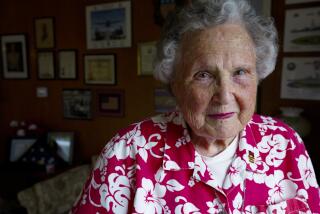9/11 miniseries trashes the truth
- Share via
ON THE MORNING of Sept. 11, 2001, Americans -- and the world -- froze, saddened and angry. Five years later, we stop to remember those we lost and those who have sacrificed in our defense since, and to reflect on what we must learn. History will define us not by the events of that day but by who we choose to become as a result.
Regrettably, ABC has chosen not to document but to dramatize this most critical of times. Its miniseries, “The Path to 9/11,” opts for fiction when fact is needed and chooses mythmaking when the candor of history is called for. The 9/11 commission report tells the story with clear-eyed honesty, precision and studious impartiality. The ABC drama does not. The 9/11 commission spent hours interviewing virtually everyone connected not just with the events of that day but those involved in counter-terrorism over 25 years -- Republican as well as Democrat. ABC did not.
Many senior officials from President Clinton’s administration, along with key members of the 9/11 commission, have publicly challenged the distortions and inaccuracies of “The Path to 9/11.” From the part of the story I know firsthand, ABC has done the American people a disservice. Drama may be more profitable than reality, but at what cost to our national history?
One of the myths perpetuated by ABC played out in the steamy port city of Aden, Yemen, in October 2000, using an FBI agent out of New York, John O’Neill, and the U.S. ambassador to that country. According to the mythmakers, a battle ensued between a cop obsessed with tracking down Osama bin Laden and a bureaucrat more concerned with the feelings of the host government than the fate of Americans and the realities of terrorism. I know this is false. I was there. I was the ambassador.
I am not here to either defend or attack O’Neill. He was a complex man. But what happened after Al Qaeda’s attack on the U.S. destroyer Cole was a complex story. Within hours, our embassy in Sana, Yemen, received support from Washington, U.S. military commands in the region and neighboring U.S. embassies. Within days, our presence in Aden went from zero to more than 300 people from the Navy, Marines, the intelligence community, the Naval Criminal Investigative Service, the FBI, the State Department and my embassy. We had a clear and common goal: honor those killed by finding those guilty.
As ambassador, I had four missions: recover the Cole and her crew; provide security for the burgeoning U.S. presence in Aden; establish a joint Yemeni-American criminal investigation, as agreed between the president of Yemen and FBI Director Louis Freeh; and maintain the Yemeni-American relationship.
These tasks were not sequential but deeply interdependent. The recovery of the ship and its crew was the most urgent. The Cole was also a crime scene, and crew members were witnesses. Recovery efforts had to be coordinated with naval investigators and the FBI. With an unsettled threat, I could not allow either to go forward without rigorous security at the harbor and at our base of operations. The least quantifiable of the four mandates was our relationship with the Yemeni authorities. Diplomatic relations are not an end in themselves but rather provide a context within which we are able to operate -- or not. Our cooperative relationship enabled the recovery, the security and the investigation to move forward, to work through the tensions, disagreements and conflicts that naturally arose. The attack on the Cole was a hostile act, but this was not a hostile government or a hostile people. It was my job to make sure everyone involved understood that our actions must not subvert our goals.
The realities of a U.S. investigative style inevitably collided headlong with the limited capabilities of Yemen. The Yemenis knew Aden and its people but lacked technical and professional competence; the FBI had the forensic and technical capability but could not operate “on the street” in Aden. The friction, the suspicion, the miscommunication between the two could not, however, be allowed to derail a successful criminal investigation of the attack, its roots in Yemen and its links to other attacks against Americans around the world. Yemen’s subsequent willingness to cooperate with us in the war on terrorism confirms the value of working with it -- not seeing it as the enemy.
In the aftermath of the attack on the Cole, the stakes were high. Former Secretary of State Colin Powell’s first lesson of leadership is that “being responsible sometimes means pissing people off.” It’s inevitable, if you are honorable. The job of the ambassador is to make the tough calls. To paraphrase a fellow Missourian, the buck stopped on my desk.
More to Read
The complete guide to home viewing
Get Screen Gab for everything about the TV shows and streaming movies everyone’s talking about.
You may occasionally receive promotional content from the Los Angeles Times.






